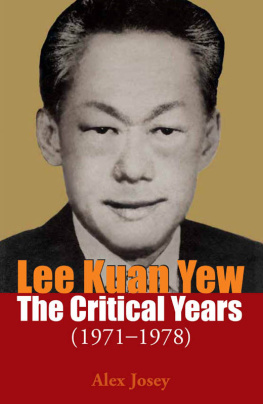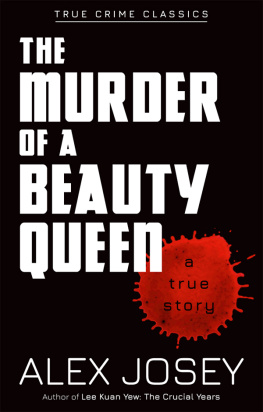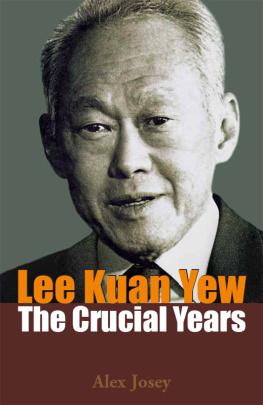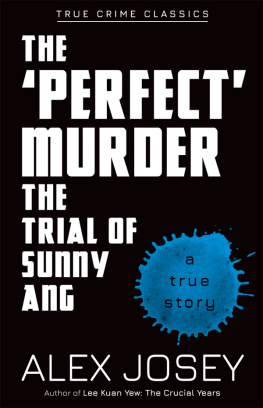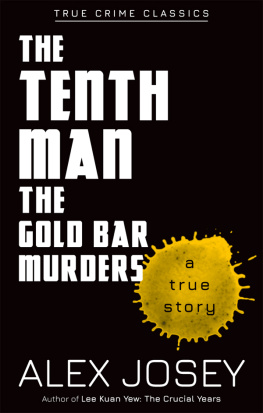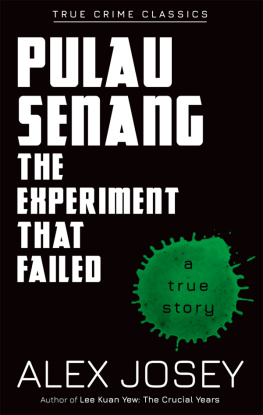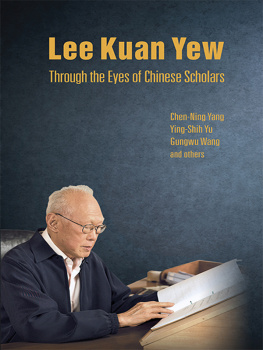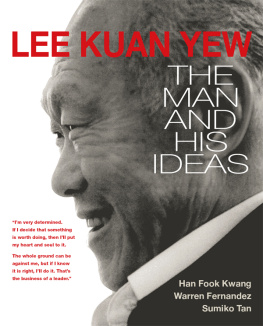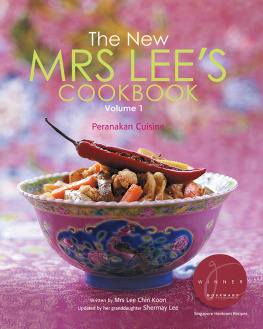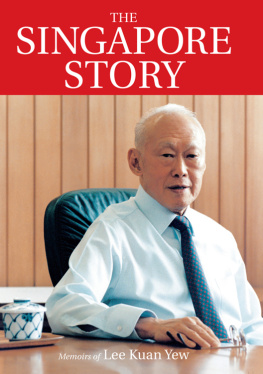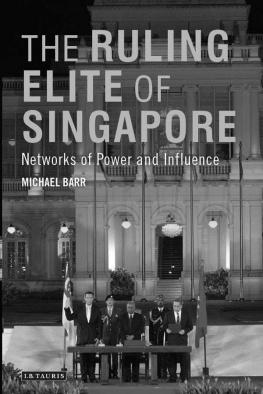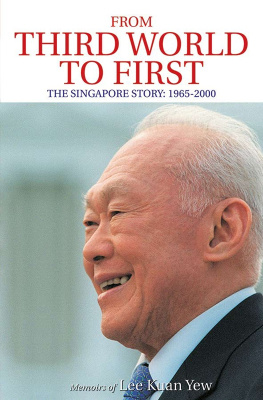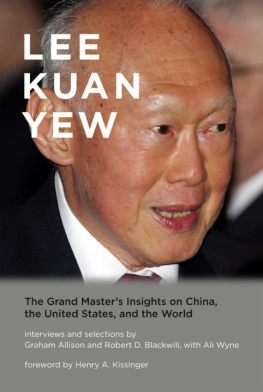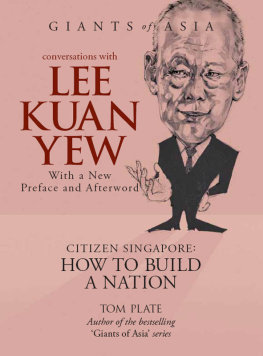(Facsimile Edition)
Alex Josey

1980 Alex Josey
Cased edition first published in 1980 by Times Books International
This paperback edition published in 2013 by
Marshall Cavendish Editions
An imprint of Marshall Cavendish International
1 New Industrial Road, Singapore 536196
All rights reserved
No part of this publication may be reproduced, stored in a retrieval system or transmitted, in any form or by any means, electronic, mechanical, photocopying, recording or otherwise, without the prior permission of the copyright owner. Request for permission should be addressed to the Publisher, Marshall Cavendish International (Asia) Private Limited, 1 New Industrial Road, Singapore 536196. Tel: (65) 6213 9300, fax: (65) 6285 4871. E-mail:
The publisher makes no representation or warranties with respect to the contents of this book, and specifically disclaims any implied warranties or merchantability or fitness for any particular purpose, and shall in no events be liable for any loss of profit or any other commercial damage, including but not limited to special, incidental, consequential, or other damages.
Other Marshall Cavendish Offices
Marshall Cavendish Corporation. 99 White Plains Road, Tarrytown NY 10591-9001, USA Marshall Cavendish International (Thailand) Co Ltd. 253 Asoke, 12th Flr, Sukhumvit 21 Road, Klongtoey Nua, Wattana, Bangkok 10110, Thailand Marshall Cavendish (Malaysia) Sdn Bhd, Times Subang, Lot 46, Subang Hi-Tech Industrial Park, Batu Tiga, 40000 Shah Alam, Selangor Darul Ehsan, Malaysia
Marshall Cavendish is a trademark of Times Publishing Limited
National Library Board, Singapore Cataloguing-in-Publication Data
Josey, Alex.
Lee Kuan Yew : the critical years : (1971-1978) / Alex Josey. Facsimile ed.
Singapore : Marshall Cavendish, 2013, c1980.
p. cm.
eISBN: 978 981 4435 68 0
1. Prime ministers Singapore Biography. 2. Singapore Politics and government 1945-1963 I. Title.
DS610.73.L45
959.5705092 dc23 OCN823774795
Printed in Singapore by Markono Print Media Pte Ltd
CONTENTS

For Mum in her 99th year,
still reading books and enjoying her crossword puzzles
Note on hanyu pinyin
Names of Chinese personalities and places have been spelt in accordance with Chinese phonetics (hanyu pinyin) wherever they appear except in quotations.
INTRODUCTION
Volume Two of Lee Kuan Yew, like Volume One, is intended to be a source book, a convenient reference to which historians and others can turn in their moment of need to find out what Lee actually said, or did, or what posture he took, at a certain time, on a certain issue. Here, in Volume Two, is the continuing story of Singapores remarkable development from the beginning of 1971 to the end of 1978, as told by Lee himself, in his own words, more than 275,000 of them.
Here are Lees fears, his hopes, his triumphs and his failures, his analytical judgements, his looks into the future, his valuations, his beliefs, his unswerving faith in the ability of the average Singaporean to understand what his Prime Minister is talking about; his supreme confidence that Singapore will survive as an independent, if inter-dependent, sovereign State, and be successful.
Early in 1979, seven by-elections were held to fill parliamentary vacancies caused by six resignations (some enforced by the PAP Central Committee), and a death. Under Lees leadership, the Peoples Action Party won them all easily with a reduced protest vote. In effect, the results provided clear evidence that Lees status continues to expand, not diminish, with the passing years. We are thus left with the tantalizing thought that more volumes of Lee Kuan Yew have yet to be written before Lee completes his contribution to the creation of modern Singapore.
August, 1979
Alex Josey
THE YEAR 1971
I
ON January 2, 1971, Dr. Benjamin Henry Sheares, a gynaecologist and obstetrician of international repute, was sworn in as the new President of the Republic. He had been unanimously elected by Parliament on December 30, 1970, following the death the previous month of President Yusof bin Ishak, Singapores first President.
The Prime Minister, in moving Dr. Sheares election, revealed to Parliament that he had explained to Dr. Sheares that within a fortnight he would have to receive the Heads of various Commonwealth delegations arriving for the Commonwealth Conference. Lee said that although Dr. Sheares was without experience in the political or diplomatic fields, his readiness to bring a disciplined intellect to bear on a new field augured well for Singapore. Dr. Sheares was sixty-three when he took office.
In his New Year Message, the Prime Minister said that workers, union leaders and grass-root leaders in the constituencies had to be told the facts of life: it would be foolish and dangerous to take for granted Singapores stability, progress and prosperity. He warned: We face multiple problems which, if most were to happen at the same time, will knock the bottom out of Singapores development. The economic crunch will come in October this year, 1971. By then nearly all British service families would have left. By January 1972, there will only be 2,200 British servicemen, as against the 30,000 now. Added to this are serious anti-pollution problems, air, and especially water. We must develop our water resources to the full. We should be able to collect and use between 25 35 per cent of the daily average of 700 million gallons of rainfall (95 inches per year) by 1975-80. This requires stiff anti-pollution measures to reduce mineral particles and acid fumes in the air, and extensive sewerage works. All sullage water from toilets, kitchens and bathrooms must go into the sewers. Then the run-off rain water can be pumped into reservoirs. Sewerage works, reservoirs, and filtration works all cost a lot of money and use up limited and valuable land.
The government and the statutory boards must improve their organisational efficiency. Officers must make a habit of being polite and courteous. The quality of recruits into the public service must be improved: ways must be found of retaining the best amongst the younger generation in the face of competition from the private sector offering richer rewards. We are within reach of solid, substantial progress in industry, on to middle technology.
The Prime Minister knew there were some hardships caused to individuals by resettlement required for development, resiting of hawkers, anti-pollution measures, and the re-vamping of bus and taxi services. However, the pace of these changes could not be slowed down. Lee said he understood the concern of the Malay community. They saw their progress as small compared to that made by the Chinese, Indians and Eurasians. But they had made some progress since 1959. And more progress could be made as the younger ones acquired more technical skills for the better jobs. Singapore had done well for 1970. But if Singapore was to get beyond simple manufacture and assembling in low value-added industries, if we are to move up to more sophisticated industries with more value added, because of higher technology, then wages would have to remain competitive. American and West European investors, looking for bases for offshore manufacturing, constantly compared the benefits of cheaper and often harder-working labour in South Korea and Taiwan. True, Singapore had certain advantages. A strategic location. A better educated people more easily trained. There were more engineers, technicians and people with management expertise. Moreover, Western industrialists were happier when they could communicate with their workers, with administrators in the government, in the Public Utilities Board, and other semi-government authorities. The English language made this possible. We offer long-term political stability, and high social standards of public health and social amenities. The point is, all these must not be jeopardised. We intend Singapore to be successful. We also intend that she be strong. Let us together resolve to demonstrate in 1971 that these are not empty slogans.

